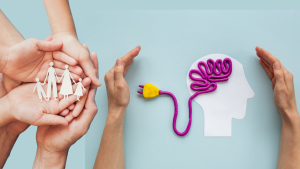
Listen to this note:
Mental health is a fundamental aspect of our well-being, but unfortunately, it remains a taboo topic in many Latino communities. Often, a lack of information and fear of being judged prevent us from speaking openly about our emotional problems and seeking help.
In 2020, 40.31% of Hispanic adults reported symptoms of depression, compared to 25.31% of non-Hispanic white adults in the United States. The prevalence of depression among Hispanics in the United States has been found to be 33.31% for women. In a research conducted by Eghaneyan and Murphy they mention that “while the phenomenon of women being more likely to be depressed than men is consistent across ethnic groups, it is more prominent in Hispanic subgroups.” (Eghaneyan, BH, et al., 2019).
Culture affects how Latinas deal with and cope with their problems, specifically in fulfilling their roles as mothers and family caregivers. Hispanic women are very strong. “It’s hard to say that we are sick. It’s hard for women to accept that we need help.”
One of the biggest challenges facing Latinos in the United States is the lack of access to culturally relevant mental health services. Language barriers and the lack of cultural competence of some health providers exacerbate this problem, leaving many people feeling misunderstood or misdiagnosed when seeking help. This is particularly true for recent immigrants, who also face the added stress of legal status and separation from their families.
?Many people in our community still view mental disorders as a sign of weakness or even as a divine punishment. This stigma can lead people to not seek professional help and instead keep their problems a secret. It is essential to understand that mental health requires professional medical and psychological care.? says Dr. Anna Lee Mraz in an interview for Por la Libre, a Peninsula 360 Press Radio program.
It is crucial that all of us start to see mental health as an integral part of our overall wellbeing. Talking openly about these issues, educating ourselves, and supporting our loved ones who may be struggling is critical to breaking the cycle of silence and stigma.
Recommendations:
Consult your doctor, who can refer you to:
The Clinic of the Race (510) 535-6200
One Life Counseling Services (650) 394-5155
Women united and active (415) 621-8140
To strengthen mental health, there are also several strategies based on studies that can be especially effective for Latino migrant communities in the United States. One of the main recommendations is to strengthen social support networks, since maintaining close relationships with friends and family provides a sense of belonging and emotional support crucial for mental health.
Research has shown that social support can act as a buffer against stress and anxiety, and in Latino communities, where family ties are often strong, leveraging these connections can be especially beneficial.
Regular physical activity not only improves physical health, but also reduces symptoms of anxiety and depression. “It is proven that doing 30 minutes of exercise a day can improve mood and act as a complementary treatment for mental health problems,” says Dr. Anna Lee Mraz in an interview for Por la Libre, a Peninsula 360 Press Radio program.
The practice of mindfulness and meditation is also useful for reducing stress and improving emotional well-being, helping people better manage their emotions, especially those experiencing stress due to immigration and cultural adaptation.
Encouraging creative expression through activities such as art, music, or writing can be another effective way to reduce stress and connect emotionally, taking advantage of the rich cultural heritage of the Latino community.
Finally, increasing mental health education and awareness can help reduce the associated stigma and encourage help-seeking when needed by providing information on how to care for one’s mental health and when to seek professional support, even if therapy is not an immediate option. Implementing these strategies offers accessible and culturally appropriate alternatives to improve emotional well-being in these communities.
You may be interested in: Medicaid: An opportunity to break the health disparity


